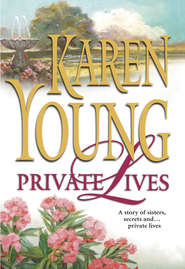По всем вопросам обращайтесь на: info@litportal.ru
(©) 2003-2025.
✖
Belle Pointe
Автор
Год написания книги
2018
Настройки чтения
Размер шрифта
Высота строк
Поля
“Do you realize what’s at stake here? We could lose everything we’ve worked for all these years.”
“Everything you’ve worked for.”
“For God’s sake, Anne, be reasonable.”
“Reasonable.” She looked at him, shaking her head. “You know what? I don’t feel like being reasonable. I’ve had it with the struggle, the ego stuff, the loneliness when you travel and I’m home alone. I haven’t been able to pursue a career because we’ve never been in one place long enough. I don’t expect you to understand because I’ve been remiss in telling you, and that’s my fault. I’m sorry, Buck, but my mind is made up.”
With the suitcase now packed, she got ready to lift it off the bed, but he stopped her with a hand on it. “At least wait a few days. Christ, you just went through an ordeal losing the baby and the accident. You just got out of the hospital.”
“Meaning you think I’m overreacting because my hormones are in an uproar.” She smiled bitterly. “Wrong. My hormones probably are in an uproar, but I know exactly who I am and what I’m doing. And if you don’t like the real me, then for sure our marriage is over.”
She tugged the handle out of his grasp and walked to the door. Hampered by his crutches, it took him a moment to get going. “I’m driving myself to the airport,” she told him as she reached the stairs. “I’ll leave a message on your voice mail telling you where to send someone to pick up my car.”
Three
As if to challenge Anne’s decision about leaving Buck, the weather turned bad and she had to spend several hours in the airport waiting for her flight to depart. By the time she got off the plane in Memphis, she’d had too much time to think, but not enough to change her mind.
She caught the first glimpse of her father and Beatrice at Baggage Claim before they spotted her. Franklin Marsh was a tall man, lean and gangly. Anne’s nose barely came to the third button on his shirt, an Oxford button-down that appeared almost a size too large. As was the tan corduroy jacket he wore. He looked exactly what he was—an academic and an author/journalist whose thoughts were often engaged elsewhere.
With tears clogging her throat, she let herself be folded into his embrace. “Don’t ask,” she whispered, guessing that she must look ready to splinter into a thousand pieces. He held her for a long moment, sensing that she needed it, just as he’d done countless times when she was a child.
“Thanks for coming to meet me, Dad,” she managed to say with a little sniff.
He made a tsk-ing sound. “And wouldn’t I go to the moon to meet my Annie-girl. How are you, love?”
“I’m okay.” Swallowing a lump in her throat, she looked beyond her father and met the anxious blue eyes of her stepmother. “Beatrice. I’ve kept you away from your shop today, haven’t I?”
“A welcome break,” Beatrice said, holding out her arms. “Is there a hug for me, too?”
Her stepmother was about Anne’s height, an attractive woman whose once-dark hair styled in a casual pageboy was rapidly turning gray. The long sweater she wore over a gauzy tiered skirt made her look exactly what she was—an aging child of the sixties. Anne stepped naturally into a warm embrace that made her throat go tight, and her doubts about her welcome disappeared.
“I’m so happy you’re here,” Beatrice said in her ear. Pulling back, she studied Anne’s face intently.
Anne brought both hands to her cheeks. “Is my makeup a mess? I know I look like something the cat dragged in.”
Beatrice shook her head, smiling. “Was I staring? If so, it’s just to check that you’re as lovely as I remembered on my wedding day.”
Again, to her consternation, Anne felt herself on the verge of tears, but somehow managed a laugh. “I guess that means I don’t look as bedraggled as I feel.” They’d met only a year ago. And once Anne got over the shock of the idea of her father remarrying, she’d liked his new wife from the start. “And thanks for being so gracious about having me. You must think I’ve got some nerve just calling and saying I’m on my way without giving you any notice.”
“You don’t have to give notice to visit us, Anne…ever.”
“That’s nice of you to say, but it has to be an inconvenience.”
“Inconvenience?” Franklin, watching them with a smile, spoke up. “What kind of nonsense is that? I wish you’d stay a month.”
“Be careful what you wish for, Dad,” she said dryly.
An hour later, as they exited Interstate 55, the gently rolling terrain of north Mississippi abruptly changed to the stark flatness of the Delta. Now in early April the land lay fallow, but in high summer the fields turned lush and green with cotton plants and in August the bolls swelled in the scorching Mississippi sun until they finally burst. Everything that had been green turned suddenly, dramatically, to snowy white. It still seemed so different to Anne, reared in New England where winters were long and gray and cold and summers all too brief.
As they neared the city limits of the town, she read a signing proclaiming Tallulah as the proud hometown of Buck Whitaker. It was a reminder that, to the folks in Tallulah, Buck was a bigger-than-life hero. At the same time, she was reminded that his celebrity would make it hard for her to keep a low profile while she was here.
Another mile and she noticed a profusion of political signs. To her surprise, the biggest and most prominent featured Buck’s brother, Pearce. “I didn’t know Pearce was involved in a political campaign.”
“No?” Franklin frowned. “I would have thought he’d contact Buck for an endorsement. The state senate is turning out to be a horse race and Buck’s name would definitely be an asset to Pearce.”
“His opponent is giving him a run for his money,” Beatrice said, “but in the end I don’t see how anyone can beat a Whitaker.”
Franklin chuckled. “My wife is supporting the opposition.”
“And who are you supporting, Dad?”
“The Spectator remains neutral,” he said piously. “So far.”
Beatrice gave Anne a knowing smile. “I’ll win him over yet.”
“All it would take for Pearce to win, with or without an endorsement from the Spectator,” Franklin said, as they approached a huge billboard picturing Buck in pitcher’s stance, “is an endorsement from Buck.”
“I forget how big Buck’s name is in this town,” Anne said, now looking at his face painted on the side of the high school gym.
“It’s understandable when you consider the odds of a town this size producing a world-class athlete,” Franklin replied.
“I guess they’ve forgotten how long it took before he was recognized as world-class,” she remarked.
On her first visit to Belle Pointe just before their wedding, Buck had still been stuck in the minor leagues, frustrated and keenly ambitious, but it had not mattered to Anne whether he ever made it into the pro ranks. She was that much in love with him. What did matter was that he spent so little time with his family. His father had died before they ever met, but his mother and Pearce, his older brother, were in Tallulah. Although Buck harbored resentment and hurt over things that had happened after his father died, she wondered if he hadn’t overreacted. People said things, did things, in the wake of a family trauma that could be worked out. To Anne, it seemed a shame to simply withdraw from his family when he had such an interesting heritage.
“There’s the turn to Belle Pointe,” Franklin said now, as they approached the ornate iron gate. “Won’t be long before folks around here find out you’re back for a visit. They’ll wonder where Buck is. What’s your plan to deal with that?”
“I don’t have a plan,” she said, gazing at the house where Buck was born. Stretching on all sides were endless cotton fields, but the house itself was surrounded by shade trees, mostly oak, sycamore and the unique and stately magnolia. Brightening the grounds nearer the house were hot-pink azaleas in full bloom.
“It is a fantastic sight, isn’t it?” Beatrice said, following her gaze.
“Yes.” She knew she would never forget her first look at Belle Pointe. It was high summer when Buck took her to meet his family. They’d driven past miles of lush cotton fields and suddenly there it was, an antebellum gem of classic Greek Revival design. She’d gazed enthralled, thinking the place looked like something out of Gone with the Wind, a white pearl in a green sea.
Franklin slowed the car. “When I see it, I sometimes get a feeling that the clock at Belle Pointe stopped somewhere in the nineteenth century. Same thing with a few other landowners around here as well. How they’ve managed to hold on to such a unique lifestyle is truly remarkable.”
“Yes, remarkable,” Anne murmured, studying a tall water tower painted like a cotton boll. “I thought the same thing myself when I first saw Belle Pointe.”
“Of course, most of the original plantations were divided up as families came on hard times. Beatrice can tell you something about that.”
“My daddy lost our land when it was sold for back taxes,” she explained at Anne’s puzzled look.
“Oh, no,” Anne murmured.
“He was a very stubborn man,” Beatrice said.
“I’ll say.” With Belle Pointe behind them now, Franklin picked up speed. Anne guessed there was a story there, but neither offered more details.
“On the other hand,” Beatrice said, “the Whitakers have managed to hold on to Belle Point for five generations. They’ve even added to the original acreage. And with your mother-in-law managing things, that’s not likely to change—at least not in this lifetime.”









